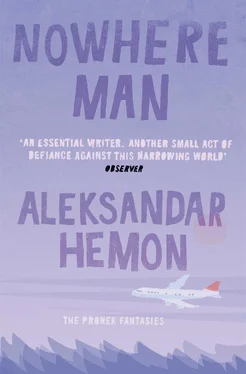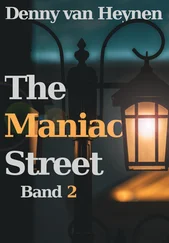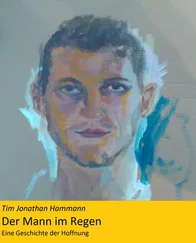It was in the summer after the fifth grade that a small reconnaissance unit of pubertal hormones — the avant-garde of a great army — entered the unconquered Pronek territory. He was spending a couple of seaside-vacation weeks with his parents in Gradac. He absorbed sun on the beach, swam in the deep waters, hoping to encounter some dolphins. He had noticed before that there were girls who didn’t have to wear a swimsuit top and that there were girls who did, but for the first time that summer he realized that there was a fundamental difference between them, so much so that he got a slap on the back of his head for staring at a girl in a pink swimsuit, her nipples swollen.
In the evenings, when pines gave off bounteous resin smells, when the breeze off the cooling sea brought forth tickling saltiness, when warm bodies exuded coconut-milky sun-lotion scent, there was a dance for kids at the hotel. The first evening, Pronek spotted a long-legged girl with her hair bleached by the sun, clearly playing for the top-wearers. She was dancing with her father, a burly man in a white undershirt, his belly bulging forward, Pronek circled around her like a hawk, until she noticed him and smiled at him, whereupon he circled some more, as hormone reinforcements kept arriving at the front. The second evening, the circles narrowed. He stopped in front of her, his head still spinning, and asked her to dance. His attitude aimed to suggest that he wanted to dance only because there was absolutely nothing else to do. They clumsily danced, like infatuated zombies, avoiding bodily contact, yet craving it. By the end of the first week, they were spending time on the beach together. Her name was Suzana, and she was from Belgrade. At the beach they had to perform a complicated glance dance, eschewing looking at each other’s interesting areas. Midway through the second week, they could not hold themselves back: their lips stiffly touched, their teeth clacking. They were sitting right at the water line, tiny waves crawling between their toes, Pronek’s arm over her shoulder, like a dead fish. The sun was setting, providing a tacky orange spill that often appears on postcards and can still bring tears to Pronek’s eyes. By the end of the second week, as his departure was looming on the glum horizon, Pronek licked her ear, as his hand was resting on her belly button, paralyzed in the nether area between the two fantastic possibilities. He, then, proposed, determined to spend the rest of his life with her. She needed to ask her father, an army colonel with a frighteningly hairy chest. He forbade her to see Pronek ever again, an order she bravely defied: they met for the last time in the bushes behind the hotel. They squatted, whispering the vows of love. With her head on his shoulder, her tears trickling into his armpit, Pronek susurrously sang “My Bonnie Lies over the Ocean,” trying hard not to keel over onto a used condom someone left behind, his throat tight with sorrow.
By the time he got back home in Sarajevo, the Pronek territory had been fully conquered. Mirza informed him in an audibly deeper voice that he was considering shaving his legs, as they were far too hairy. Shortly after the new school year started, Pronek received a letter from Suzana, barely mentioning their eternal love and containing a picture of her “friend,” a lanky pimplehead in a Sex Pistols T-shirt with the fine name of Tadija.
The hard part in writing a narrative of someone’s life is choosing from the abundance of details and microevents, all of them equally significant, or equally insignificant. If one elects to include only the important events: the births, the deaths, the loves, the humiliations, the uprisings, the ends and the beginnings, one denies the real substance of life: the ephemera, the nethermoments, much too small to be recorded (the train pulling into the station where there is nobody; a spider sliding down an invisible rope and landing on the floor just in time to be stepped on; a pigeon looking straight into your eyes; a tender hiccup of the person standing in front of you in line for bread; an unintelligible word muttered by a one-night stand, sleeping naked and nameless next to you). But you cannot simply list all the moments when the world tickles your senses, only to seep away between your fingers and eyelashes, leaving you alone to tell the story of your life to an audience interested only in the fireworks of universal experiences, the roller coaster rides of sympathy and judgment.
Thus I am forced to describe the significant events occurring after Pronek’s first love disaster: he locked himself up in his room and refused to come out for three days, his mother leaving food in front of the door, only to find it untouched; he announced his decision to abolish his accordion studies; he got drunk with Mirza on the cheap stuff (with labels brandishing drunken sailors and knights with javelins) from his father’s booze chest; he got caught masturbating at his desk, instead of studying Nature and Society; he demanded in no uncertain terms that he be granted funds for acquiring a guitar, which was initially declined mainly because of his brash manner, but then approved with the hope that he would stop being such an ass; he woke up in the middle of the night overwhelmed with source-less anger, then roamed the apartment, hoping to startle his parents out of their tranquil dreams.
Nevertheless, let us zoom in on an insignificant moment: he walked down Strosmajerova and stopped in front of the music store and saw a Beatles songbook. Let us face the store window with him. Let us be aware that an old man with a crooked hand that trembled on his walking stick stood next to him. Let us turn toward the cathedral and see the street rising to meet its stairs. Let us hear the cathedral’s bells. Let us believe that Ringo winked at him from the songbook cover. If we have done all this, there is the final step: let us foresee the future in which Pronek is surrounded with girls who all shake their heads following the magic rhythm of his guitar, their tresses quivering — let us be rewarded with a pleasant tingle of an intense epiphany.
From thereon in, Pronek embarked on a secret project of getting the songbook — weeks of pilfering his mother’s wallet for change, or searching through his father’s pockets, finding an occasional banknote, and sometimes a condom, all the while managing to keep his operation covert.
The day he acquired the songbook belongs to the category of significant events: I need not describe all the adolescent emotional excess, but I do need to mention that he rushed to his friend Mirza’s, protecting his acquisition as if it were a sacred manuscript. They feverishly flipped through it — Pronek tried to sing a song or two, the logic of music clear to him (despite misreading a few notes) like a bright winter day, when you can see the snowy mountain peaks around Sarajevo and feel that life has no limits.
In Mirza’s parents’ living room — a picture on the wall of a rosy-cheeked boy with a teardrop twinkling below his innocent eye, an array of crystal glasses in the cupboard tinkling as Pronek and Mirza moved around the room — it was decided that they would have a band that would play the songs from the Beatles songbook. Pronek was to be John, Mirza was to be Paul, and they needed a George and a Ringo. Then they began searching for the name — The Beatles, obviously, was already taken — so they came up with Gospoda (translating as Gentlemen); KGB (would not do well in the West); FBI (short for Fucking Boys International, would not do well in the East); Los Bosancheros. Finally, they settled for the simple translation of The Beatles— Bube. By the end of the week, they already had designed their future album covers (the two of them, plus George and Ringo, sinking in a boat; an aerial picture of Sarajevo, with four stars sparkling in four different parts of town:  engi
engi  Vila, Baš
Vila, Baš  aršija, Koševo, Bistrik).
aršija, Koševo, Bistrik).
Читать дальше

 engi
engi  Vila, Baš
Vila, Baš 










